Tai Chi reduces anxiety in newcomers through its unique blend of gentle movements, mindfulness, and breathing techniques. As you practice, you'll synchronize your breath with slow, fluid motions, creating a moving meditation that interrupts worry cycles. The gentle, flowing movements ease physical tension and promote relaxation, while the focus on balance and coordination boosts confidence. Tai Chi's emphasis on present-moment awareness helps quiet racing thoughts, and its social aspects provide a supportive environment. Regular practice can improve sleep quality, reduce stress hormones, and enhance overall well-being. Discover how Tai Chi's principles can transform your approach to managing anxiety.
Understanding Tai Chi's Calming Principles

Harmony lies at the heart of Tai Chi's calming principles. As you practice this ancient Chinese martial art, you'll discover how it seamlessly blends physical movement with mental focus. Tai Chi encourages you to synchronize your breath with slow, fluid motions, creating a moving meditation that naturally reduces stress and anxiety.
The core philosophy of Tai Chi emphasizes balance and flow. You'll learn to cultivate a sense of rootedness through proper posture and weight distribution, which helps ground your energy and calm your mind.
As you progress, you'll develop an awareness of the interplay between yin and yang forces, both within your body and in your surroundings.
Tai Chi's gentle, circular movements promote the smooth flow of qi (life energy) throughout your body. This enhanced energy circulation can help release tension and promote relaxation.
You'll also find that the practice encourages mindfulness, keeping you focused on the present moment and reducing anxious thoughts about the future.
Mindfulness in Motion
Tai Chi offers a unique approach to mindfulness through its gentle, flowing movements.
As you practice, you're encouraged to focus on the present moment, becoming acutely aware of your body's position and sensations.
This combination of physical movement and mental focus creates a meditative state that can help reduce anxiety and promote overall well-being.
Present-Moment Awareness Practice
One of the core principles in Tai Chi practice is present-moment awareness, often described as mindfulness in motion. As you engage in Tai Chi, you're encouraged to focus your attention on the here and now, letting go of worries about the future or regrets about the past. This practice helps you cultivate a state of calm alertness, where you're fully immersed in the present experience.
During Tai Chi, you'll concentrate on your breath, the subtle movements of your body, and the sensations in your muscles and joints. You'll notice the feeling of your feet connecting with the ground and the air moving across your skin. This intense focus on physical sensations anchors you in the present moment, effectively reducing anxiety by interrupting the cycle of rumination and worry.
As you continue to practice, you'll find that this present-moment awareness extends beyond your Tai Chi sessions. You'll become more adept at recognizing when your mind wanders and gently bringing it back to the present.
This skill can greatly reduce anxiety in your daily life, helping you stay grounded and centered even in stressful situations.
Gentle, Flowing Movements
The gentle, flowing movements of Tai Chi form the cornerstone of its anxiety-reducing benefits. As you practice, you'll find that these movements engage your body in a way that's both calming and invigorating. Unlike high-intensity exercises that can sometimes increase stress, Tai Chi's slow, deliberate motions allow you to focus on each movement, promoting a sense of control and mindfulness.
You'll notice that Tai Chi emphasizes smooth shifts between postures, creating a continuous flow that mirrors the natural rhythms of your body. This fluidity helps release tension in your muscles and joints, gradually easing physical symptoms of anxiety. As you perform these graceful movements, you're also improving your balance and coordination, which can boost your confidence and reduce feelings of vulnerability often associated with anxiety.
The rhythmic nature of Tai Chi's movements also serves as a form of moving meditation. You'll find that concentrating on executing each motion precisely helps quiet your mind, shifting your focus away from anxious thoughts and into the present moment. This mindfulness in motion can greatly reduce your overall anxiety levels over time.
Breathing Techniques for Stress Relief

Within the practice of Tai Chi, breathing techniques play an essential role in managing stress and anxiety. You'll learn to focus on your breath, synchronizing it with your movements. This mindful breathing helps calm your nervous system and reduces stress hormones in your body.
As you practice Tai Chi, you'll develop diaphragmatic breathing, also known as belly breathing. This technique involves breathing deeply into your abdomen rather than shallowly into your chest. It's a powerful tool for relaxation and can be used anytime you feel anxious or overwhelmed.
You'll also encounter the "Taoist Reverse Breathing" technique, where you contract your abdomen during inhalation and expand it during exhalation. This method is believed to increase energy flow and promote inner balance.
To help you visualize these breathing techniques, imagine:
- A gentle wave rising and falling in your belly
- A balloon slowly inflating and deflating within your chest
- A cool breeze flowing in through your nose and warm air flowing out through your mouth
- A golden light expanding throughout your body with each breath
Gentle Movements Ease Physical Tension
Complementing these powerful breathing techniques, Tai Chi's gentle movements work wonders for easing physical tension. As you practice Tai Chi, you'll notice how each slow, deliberate motion helps release tightness in your muscles. The flowing sequences encourage your body to relax, reducing the physical manifestations of anxiety.
You'll find that Tai Chi's emphasis on proper alignment and weight distribution helps correct postural imbalances. This can alleviate chronic tension in your neck, shoulders, and back – common areas where stress accumulates. As you move through the forms, you're fundamentally giving yourself a gentle, full-body massage.
The continuous, circular motions of Tai Chi promote circulation and flexibility. This increased blood flow helps flush out stress hormones and delivers oxygen to tense muscles. You'll likely experience a sensation of warmth and looseness spreading through your body as you practice.
Moreover, Tai Chi's focus on proprioception – your body's awareness of its position in space – helps you become more attuned to areas of tension. This heightened body awareness allows you to consciously release tight spots, further reducing physical stress.
Focusing on the Present Moment

Through its emphasis on mindfulness, Tai Chi cultivates a powerful focus on the present moment. As you practice, you'll find yourself immersed in the here and now, letting go of worries about the past or future. This present-focused state helps reduce anxiety by redirecting your attention away from stressful thoughts and onto your immediate experience.
During Tai Chi, you'll concentrate on:
- The rhythm of your breath
- The sensation of your feet connecting with the ground
- The fluid movement of your arms through space
- The subtle shifts in your balance and posture
By engaging fully with these sensations, you're less likely to dwell on anxiety-provoking thoughts. You'll learn to observe your thoughts without judgment, allowing them to pass by like clouds in the sky. This mental discipline extends beyond your practice sessions, helping you stay grounded in daily life.
As you become more adept at focusing on the present, you'll find it easier to interrupt anxious thought patterns. You'll develop a greater awareness of your body's stress signals and be better equipped to address them before anxiety escalates.
This heightened mindfulness can lead to a more balanced, less anxious state of being.
Social Support in Group Classes
Group Tai Chi classes offer a unique blend of physical practice and social connection. When you join a class, you're not just learning movements; you're becoming part of a supportive community. This social aspect can greatly reduce anxiety by providing a sense of belonging and shared experience.
As you practice alongside others, you'll find comfort in knowing that everyone is learning and improving together. You'll likely form bonds with your classmates, creating a network of support that extends beyond the practice space. This camaraderie can help alleviate feelings of isolation often associated with anxiety.
The group setting also encourages accountability. You're more likely to attend regularly when you know others are expecting you, which helps maintain consistency in your practice. Additionally, observing others' progress can inspire and motivate you, boosting your confidence and reducing anxiety about your own abilities.
Instructors in group classes often foster a non-competitive, accepting environment. This atmosphere allows you to focus on your own growth without the pressure of comparison, further reducing anxiety and promoting a positive self-image.
Boosting Self-Confidence Through Practice
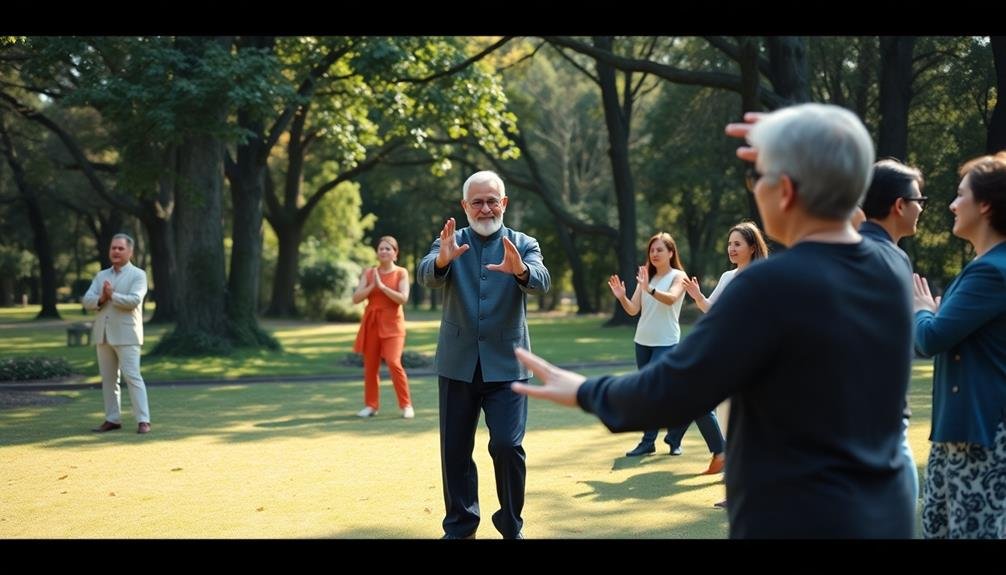
Regular Tai Chi practice can considerably boost your self-confidence, creating a positive ripple effect in managing anxiety. As you progress in your Tai Chi journey, you'll notice improvements in your physical balance, coordination, and strength. These tangible gains translate into a stronger sense of self-assurance that extends beyond the practice space.
You'll find yourself standing taller, moving with more grace, and feeling more centered in your daily life. This newfound bodily awareness can help you feel more grounded and in control, reducing anxiety-inducing thoughts and sensations. As you master complex movements and forms, you'll experience a sense of accomplishment that further enhances your self-esteem.
Tai Chi's meditative aspects also contribute to increased self-confidence by:
- Calming your mind and reducing negative self-talk
- Improving your ability to focus and stay present
- Enhancing your emotional regulation skills
- Fostering a deeper connection between your mind and body
With consistent practice, you'll develop a quiet inner strength that helps you face life's challenges with greater ease and confidence, ultimately reducing anxiety's hold on your life.
Promoting Mind-Body Connection
Tai Chi's focus on promoting mind-body connection can help you manage anxiety effectively.
You'll learn to heighten your awareness of physical sensations, syncing your breath with each movement to stay present.
Awareness of Physical Sensations
As practitioners move through Tai Chi sequences, they develop a heightened awareness of their physical sensations, fostering a strong mind-body connection.
You'll notice subtle changes in your body as you perform each movement, from the gentle shift of weight between your feet to the controlled tension in your muscles.
This increased awareness helps you identify and release areas of tension, promoting relaxation and reducing anxiety.
You'll become attuned to your breath, learning to synchronize it with your movements, which further enhances your sense of calm and focus.
By paying close attention to your physical sensations during Tai Chi, you'll:
- Feel the gentle stretching of your muscles as you extend your arms
- Notice the grounding sensation as your feet connect with the earth
- Experience the flow of energy (qi) moving through your body
- Sense the subtle balance adjustments your body makes during changes
This heightened awareness extends beyond your practice, helping you recognize and address physical manifestations of anxiety in your daily life.
You'll be better equipped to identify early signs of stress and take proactive steps to manage them, leading to improved overall well-being and reduced anxiety levels.
Syncing Breath With Movement
Building on the heightened physical awareness developed in Tai Chi, synchronizing your breath with your movements takes the mind-body connection to a new level.
As you practice, you'll learn to coordinate your inhales and exhales with specific movements, creating a rhythmic flow that calms your mind and reduces anxiety.
This synchronization helps you stay present in the moment, focusing your attention on the interplay between breath and movement.
You'll find that this practice naturally slows your breathing, promoting a relaxation response in your body.
As you inhale, you might extend or expand a movement, and as you exhale, you may contract or sink into a pose.
Mindful Body Positioning
Every movement in Tai Chi requires mindful body positioning, which is essential for promoting a strong mind-body connection.
As you practice, you'll become more aware of your body's alignment, balance, and tension. This heightened awareness helps you identify and release physical stress, which often correlates with mental anxiety.
When you focus on precise positioning, you're forced to stay present in the moment, leaving little room for anxious thoughts.
You'll learn to:
- Root your feet firmly into the ground, feeling the earth's stability
- Align your spine, imagining a string pulling you upright from the crown of your head
- Relax your shoulders, allowing them to drop away from your ears
- Soften your gaze, reducing visual stimuli and turning attention inward
Reducing Cortisol Levels Naturally
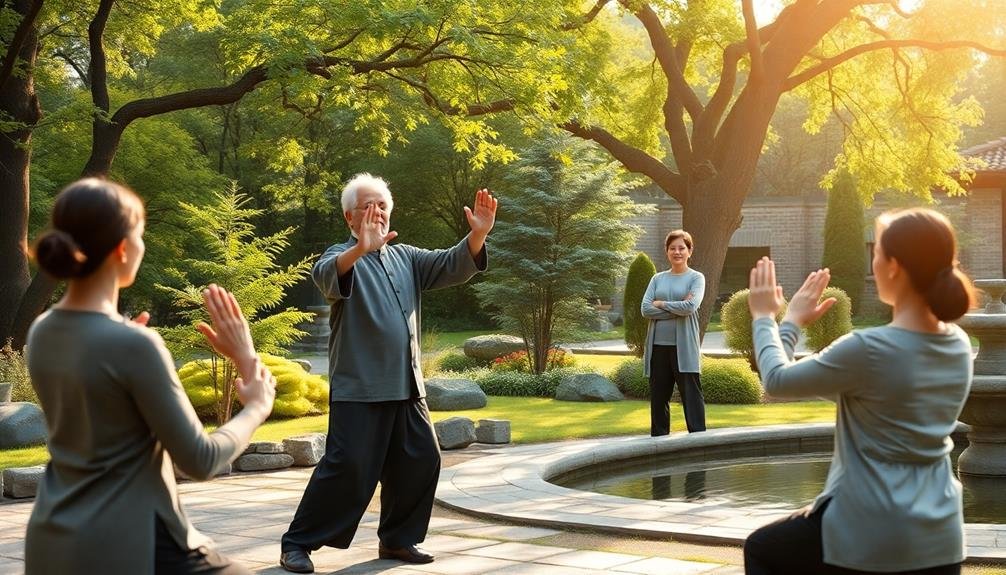
Three natural methods can effectively reduce cortisol levels in your body. First, regular Tai Chi practice helps calm your mind and body, decreasing stress hormones. Second, deep breathing exercises activate your parasympathetic nervous system, counteracting the fight-or-flight response. Third, maintaining a consistent sleep schedule regulates your body's natural cortisol rhythm.
Tai Chi's gentle movements and focus on breath work together to lower cortisol levels. As you practice, you'll notice a decrease in anxiety and an increase in overall well-being. The following table illustrates the emotional benefits of reduced cortisol levels:
| Emotion | Before Tai Chi | After Tai Chi |
|---|---|---|
| Anxiety | High | Low |
| Calmness | Low | High |
| Irritability | High | Low |
| Contentment | Low | High |
| Self-control | Low | High |
Improving Sleep Quality
After practicing Tai Chi regularly, you'll likely notice improvements in your sleep quality. The gentle, flowing movements and deep breathing techniques of Tai Chi help calm your mind and relax your body, setting the stage for better sleep.
As you become more proficient in Tai Chi, you'll find it easier to unwind before bedtime, reducing the time it takes to fall asleep. Tai Chi's impact on sleep quality extends beyond just falling asleep faster. You'll experience deeper, more restorative sleep cycles, waking up feeling refreshed and energized.
The practice helps regulate your body's circadian rhythm, promoting a more natural sleep-wake cycle. Additionally, the mindfulness aspect of Tai Chi teaches you to quiet racing thoughts, making it easier to drift off peacefully.
To create a sleep-conducive environment after your Tai Chi practice, consider:
- Dimming lights and using soft, warm tones
- Diffusing calming essential oils like lavender or chamomile
- Playing gentle, ambient sounds or white noise
- Using breathable, comfortable bedding materials
Enhancing Balance and Coordination
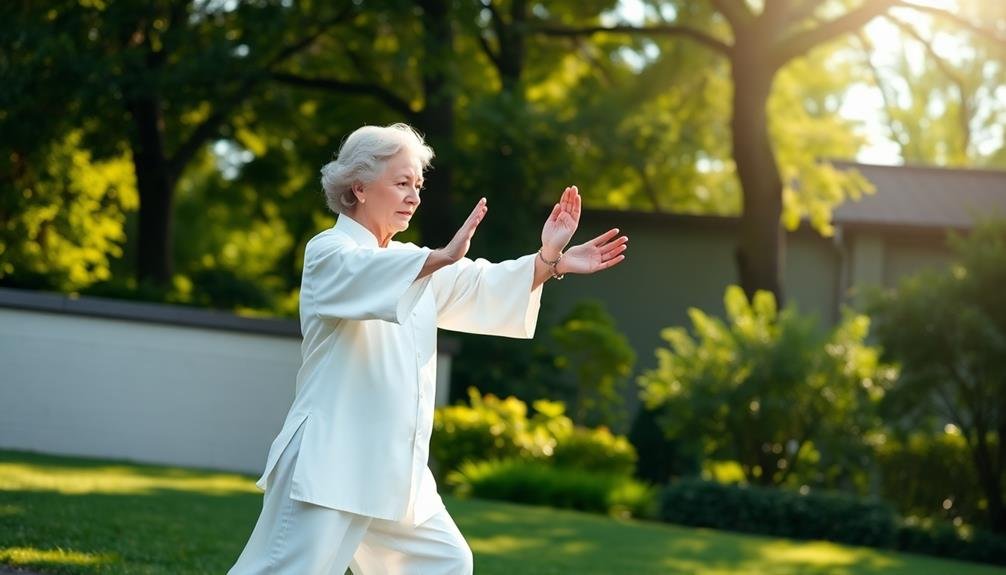
Tai Chi's slow-motion movements serve as a balance-boosting powerhouse, greatly enhancing your coordination and stability. As you practice, you'll find yourself becoming more aware of your body's positioning and movement through space. This heightened proprioception helps you maintain better balance in everyday activities, reducing the risk of falls and injuries.
The deliberate, controlled movements of Tai Chi challenge your body to maintain equilibrium while shifting weight and changing positions. You'll strengthen the muscles responsible for balance, particularly in your legs and core.
As you progress, you'll notice improved coordination between your upper and lower body, leading to smoother, more efficient movements in daily life. Tai Chi's focus on proper alignment and posture further contributes to better balance.
You'll learn to distribute your weight evenly and maintain a centered stance, which translates to improved stability in various situations. The practice also enhances your ability to react quickly to unexpected balance challenges, making you more agile and sure-footed.
These benefits can be especially valuable as you age, helping you maintain independence and confidence in your physical abilities.
Cultivating Patience and Self-Acceptance
Practicing Tai Chi cultivates two essential qualities for managing anxiety: patience and self-acceptance. As you learn the slow, deliberate movements, you'll find yourself embracing a more patient mindset.
You'll discover that progress doesn't happen overnight, but through consistent practice and dedication.
Self-acceptance grows as you become more attuned to your body's capabilities and limitations. You'll learn to appreciate your progress, no matter how small, and to be kind to yourself when facing challenges.
This mindset shift can greatly reduce anxiety by helping you let go of perfectionism and unrealistic expectations.
Tai Chi's meditative aspects encourage you to:
- Focus on your breath, grounding you in the present moment
- Observe your thoughts without judgment, fostering emotional resilience
- Connect with your body's sensations, promoting self-awareness
- Embrace stillness, allowing inner calm to emerge
Integrating Tai Chi Into Daily Life
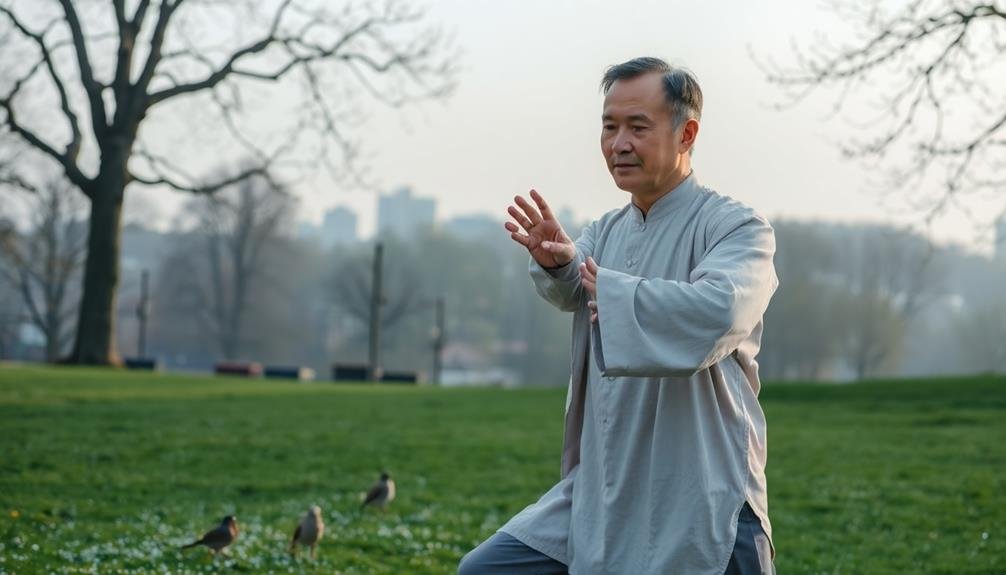
The true power of Tai Chi emerges when you weave its principles into your everyday routine. You don't need to limit your practice to formal sessions; instead, incorporate Tai Chi's mindfulness and movement into daily activities. Try practicing deep breathing while waiting in line, or perform gentle stretches during work breaks. You'll find that these small moments of mindfulness can notably reduce anxiety throughout your day.
To help you integrate Tai Chi into your life, consider the following suggestions:
| Time of Day | Tai Chi Practice | Benefit |
|---|---|---|
| Morning | Gentle stretches | Energizes and focuses mind |
| Midday | Standing meditation | Reduces stress and tension |
| Evening | Slow form practice | Relaxes body and improves sleep |
Frequently Asked Questions
How Long Does It Take to See Anxiety-Reducing Benefits From Tai Chi?
You'll likely start noticing anxiety-reducing benefits from Tai Chi within a few weeks of regular practice. However, the timeline can vary for each person. Stick with it consistently, and you'll see improvements in your mental state over time.
Can Tai Chi Help With Specific Phobias or Panic Attacks?
Yes, tai chi can help with specific phobias and panic attacks. You'll learn to control your breathing, focus your mind, and relax your body. These skills can reduce anxiety symptoms and help you manage phobias and panic more effectively.
Are There Any Age Restrictions for Practicing Tai Chi?
You'll find Tai Chi suitable for all ages. There aren't any strict age restrictions. You can start practicing at any time in your life. It's gentle enough for seniors and can be adapted for children too.
How Does Tai Chi Compare to Other Anxiety-Reducing Exercises Like Yoga?
You'll find Tai Chi and yoga both reduce anxiety effectively. They're similar in promoting mindfulness and relaxation, but Tai Chi's flowing movements may be gentler on your joints. Choose based on your preferences and physical abilities.
Can Tai Chi Be Practiced Effectively at Home Without an Instructor?
You can practice Tai Chi at home effectively. Start with online tutorials or instructional videos. Focus on basic forms and movements. As you progress, you'll develop balance and flow. Remember, consistency is key for mastering Tai Chi without an instructor.
In Summary
You've now discovered why Tai Chi is so effective at reducing anxiety for beginners. It's a holistic practice that combines mindfulness, gentle movement, and focused breathing. As you continue your Tai Chi journey, you'll find it easier to stay present, release tension, and cultivate self-acceptance. Remember, it's not just about the movements; it's about integrating these calming principles into your daily life. Embrace the practice, and you'll likely experience improved sleep, balance, and overall well-being.

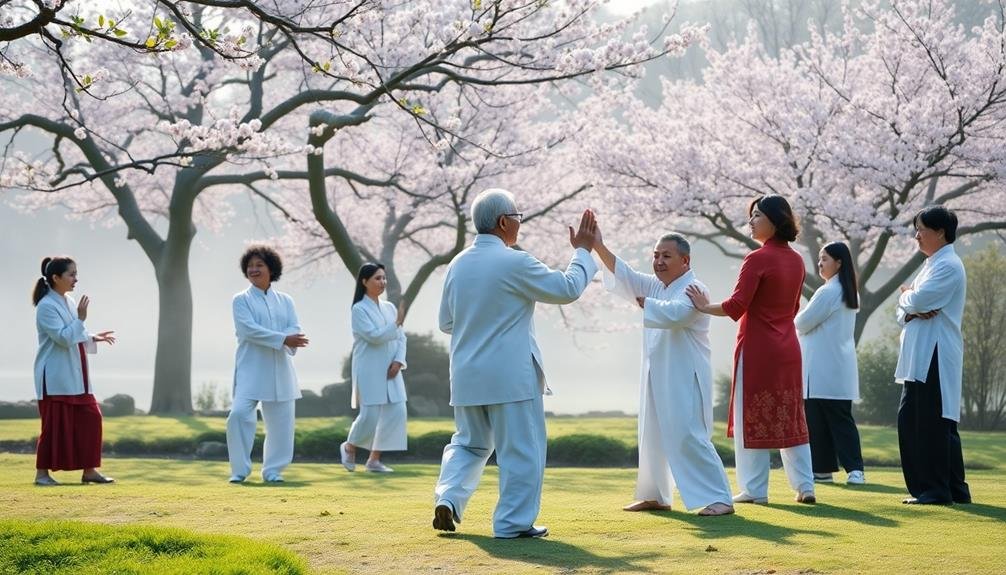
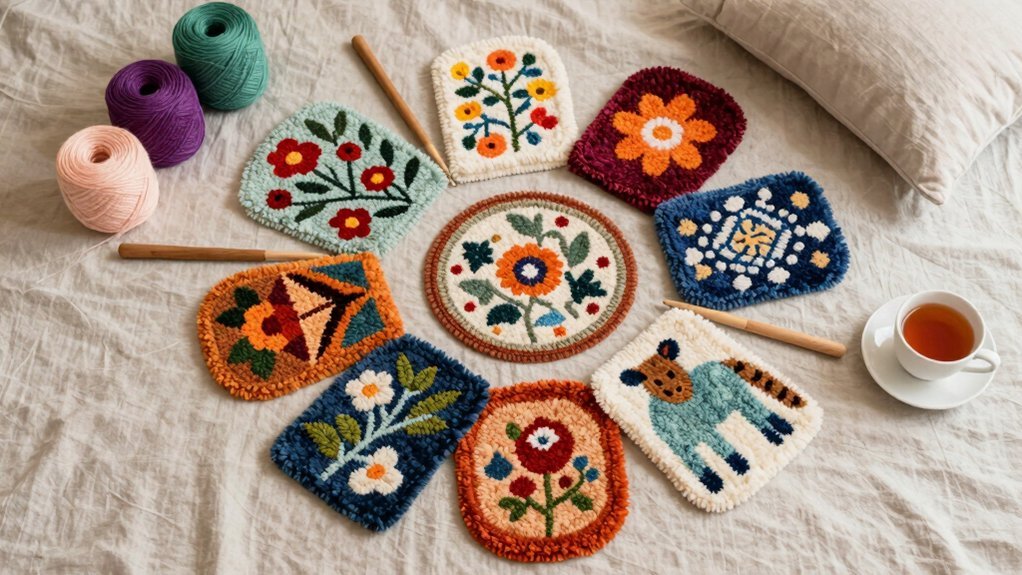


Leave a Reply